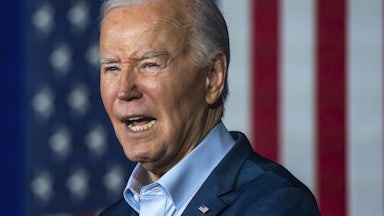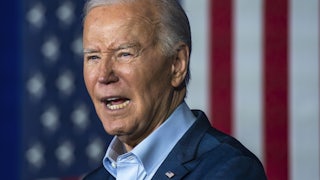The story seems to always go like this: A Democratic administration wants to pass a major policy initiative. Democrats, in theory, have the votes to pass it. A group of rabble-rousers—almost always moderates, maybe or maybe not coincidentally—gums up the process. Heated negotiations ensue. The rebellion fails. Democrats move on to passing the policy initiative, in roughly the same shape as before all the fighting.
That’s what happened in 1993 with Bill Clinton and his first budget, when he endured six defections in the Senate and 41 in the House before the bill passed by one vote in each chamber. That’s what happened during the congressional battles over Obamacare in 2010. And that’s what happened over the last few days with the Biden administration’s infrastructure bill. At several points in recent days, it looked like the Biden agenda might be dead.
With Obamacare, then-Senator Joe Lieberman and former Michigan Representative Bart Stupak became the faces of quixotic obstruction. This time around it was Representative Josh Gottheimer, a semianonymous congressman from New Jersey whom reporters and congressional folk describe as excessively ambitious and press-hungry. Gottheimer led a band of about 10 Democratic House members in threatening to upend the process that Democratic leadership and the White House had carefully mapped out for its core $1 trillion infrastructure bill and the more expansive $3.5 trillion budgetary blueprint set to pass through reconciliation. The plan was meant to avoid triggering serious protests from progressives, centrists, or any other group of Democratic lawmakers in Congress.
The 10 Democrats argued in interviews and op-eds that Congress shouldn’t wait to pass the hard infrastructure bill until after congressional Democrats pushed through the $3.5 trillion budget framework. There wasn’t a clear ideological or geographical glue holding the moderate objectors together. Some hailed from reliably Democratic districts while others represented more conservative ones. There wasn’t a uniting region or a strict ideological viewpoint tying all of them together. And it wasn’t obvious how any of the rebellious Democrats would benefit in the midterms from possibly tanking the Democratic president’s signature bill.
“I’m not sure what their ultimate play is—how do you communicate to a swing voter that you deserve credit for holding up widely popular legislation with a parliamentary ploy because it shows your moderation?” a Democratic strategist close to Joe Biden said. “Never mind expect them to give you credit for it.”
So how did the White House and Speaker Nancy Pelosi pull the dissenters back from the cliff? Negotiations between Pelosi, the White House, Gottheimer, and the other “moderate” Democrats went on for about a week, culminating in a late-night huddle in the House majority leader’s office on Monday night and more negotiations on Tuesday.
Pelosi and her team leaned on the rank-and-file members. The White House dispatched some of its top Hill liaisons—Brian Deese, Shuwanza Goff, Louisa Terrell, Steve Ricchetti—who were “in touch with a wide range of members, including some in the group of nine,” according to a source familiar with those talks.
In the end, the moderates didn’t come away with much: an agreement to hold a vote on the infrastructure bill by September 27, which was essentially what was going to happen anyway. This wasn’t really about that, other Democrats snarked. It was about attention.
“A lot of these guys love the glow of the press,” said a former Democratic congressional chief of staff turned lobbyist.
Gottheimer himself got something other than a win: a vastly higher profile than he had three weeks ago. On Monday night he was huddling with top congressional Democratic brass. He was the source of a Q&A in The Atlantic at the beginning of the week. Congressional reporters roamed the hallways looking for him. Gottheimer’s name was being printed in major newspapers and spoken anxiously on major news networks. He was being compared to lawmakers past and present notorious for finding some reason to hold up big legislation.
“Under the guise of good government, it’s a push for attention,” said Luke Albee, a former chief of staff to Senator Pat Leahy.
In the end, Democrats approved the $3.5 trillion budget blueprint, which also set up a vote on the $1 trillion infrastructure bill, 220-212, with all 10 moderates voting for it. The outcome seemed inevitable hours before.
“From the beginning there was never a disagreement about substance,” Representative Hakeem Jeffries of New York, the chair of the House Democratic Caucus, said at a press conference ahead of the vote.
So after all the hand-wringing, excited headlines, and urgent staff meetings, the Biden infrastructure initiative is in the same shape it was a few weeks ago. Gottheimer is a little more famous—but also a little more infamous to Pelosi, a caucus leader few members boast about locking horns with. And thanks to the three-term New Jersey congressman and his allies, Joe Biden is now the third Democratic president in a row to get a lot of flak from the more centrist wing of the party but come out essentially unscathed. At least for now.








